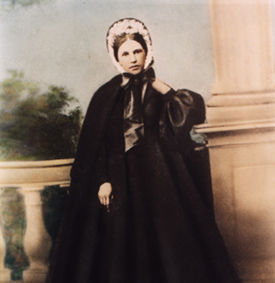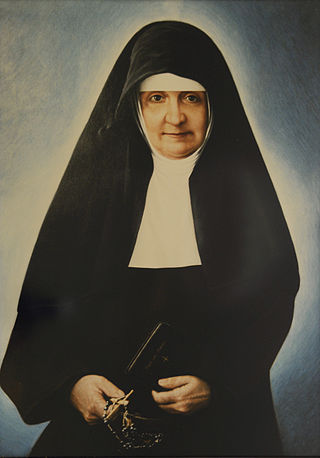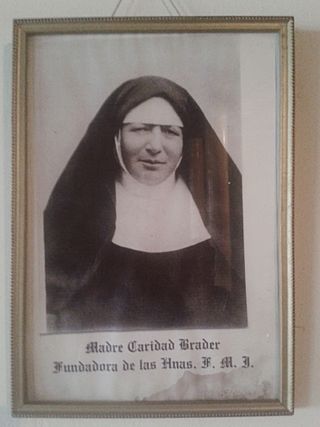Francesco Spoto was an Italian Catholic priest who served in the missions in the Democratic Republic of Congo and was killed there. He was also a professed member from the Missionary Servants of the Poor.

Maria Franciszka Siedliska, also known by her religious name Maria of Jesus the Good Shepherd, was a Polish Roman Catholic professed religious and the founder of the Sisters of the Holy Family of Nazareth. In childhood Siedliska was indifferent to her faith but after a local priest had converted her she became aware of a call to the religious life which her parents opposed. However the death of her father in 1870 enabled her to pursue her vocation. In 1873 she decided to found a religious congregation that received the blessing of Pope Pius IX before being established during Advent in 1875. Siedliska expanded her congregation from Rome to her native Poland and elsewhere, including Great Britain, France and the USA where she visited during her extensive travels.

María Bernarda Bütler, born Verena Bütler, was a Swiss religious sister. She founded the Franciscan Missionary Sisters of Mary Help of Sinners and served in the missions in Ecuador and Colombia. Bütler worked for the care of the poor in these places until her exile from Ecuador and entrance into Colombia where she worked for the remainder of her life. The congregation moved there with her, and continued to expand during her time there until her death.

Cándida María de Jesús, born Juana Josefa Cipitria y Barriola, was a Spanish nun and the founder of the Daughters of Jesus. The order – founded in 1871 – was under Jesuit direction from her spiritual director and was involved with the education of children in Salamanca though expanded during her lifetime.

María Romero Meneses, FMA was a Nicaraguan Catholic religious sister and a professed member from the Salesian Sisters of Don Bosco dubbed the "Social Apostle of Costa Rica".

Giulia Salzano was an Italian Roman Catholic professed religious and the founder of the Catechetical Sisters of the Sacred Heart of Jesus (1905). Salzano served as a teacher prior to becoming a religious and since 1865 worked in Casoria as a teacher for children where she demonstrated herself as an apt catechist and instructor.

Bolesława Maria Lament was a Polish religious sister and the founder of the Missionary Sisters of the Holy Family. Lament worked as a seamstress and soon joined a religious congregation though left just prior to her profession upon experiencing vocational doubts; she returned to her life as a seamstress and worked with two of her sisters to support their siblings and widowed mother. The death of her seminarian brother prompted her to return to the religious life – Honorat Koźmiński encouraged this return – and she later founded a congregation that soon spread and took her to Russia though its revolution forced her departure during World War I. Pope John Paul II beatified Lament while in Poland in 1991.

Maria Jabłońska - in religious Bernardyna - was a Polish Roman Catholic professed religious and the co-founder of the Sisters Servants of the Poor (1891) that she founded alongside Albert Chmielowski.
Giuseppina Nicoli was an Italian Roman Catholic religious sister. Nicoli - aged 20 at the time - became a member of the Vincentians and became a catechist in Sardinia where she was positioned for most of her life despite holding several positions of leadership in Turin and elsewhere for a brief period.

María del Carmen Sallés y Barangueras, also known by her religious name Carmen of Jesus, was a Spanish Roman Catholic professed religious and the founder of the Missionary Sisters of the Immaculate Conception. Sallés is best known for being a strong advocate of both genders being equal and a staunch defender of the rights of women, since she made this the focus of her life from the beginning of her entrance into the religious life.

María Guadalupe García Zavala – born Anastasia Guadalupe García Zavala – was a Mexican Roman Catholic religious sister and the co-founder of the Handmaids of Santa Margherita and the Poor. She is also known as "Mother Lupita". At one time, she was engaged to be married but she decided her religious call was too strong for that and she broke off her engagement in order to pursue this call. She dedicated herself to the care of ill people and was noted for her compassion and faith.

Blessed Maria Teresa of Saint Joseph, DCJ, was a German religious sister and the founder of the Carmelite Daughters of the Divine Heart of Jesus. Tauscher worked in Cologne and was removed from her position after she converted to Roman Catholicism in 1888 so founded a congregation in the Netherlands upon choosing the Carmelite charism for her life.

Assunta Marchetti was an Italian Roman Catholic religious sister and the co-founder of the Missionary Sisters of Saint Charles Borromeo Scalabrinians; she worked in Brazil from 1895 until her death. She has been beatified as a Blessed Mother. Her priest brother Giuseppe is titled as Venerable on the path to sainthood.

María Josefa Sancho de Guerra was a Spanish Roman Catholic nun who established her own congregation known as the Servants of Jesus of Charity. She wanted her new congregation to focus on the care of the sick and the poor. She assumed the religious name of "María Josefa of the Heart of Jesus".
Antonia Maria Verna was an Italian Roman Catholic religious sister and the founder of the Suore di carità dell'Immacolata Concezione. Verna left her hometown when she was fifteen due to increasing offers of marriage and returned sometime later when she decided to pursue her religious vocation. Her emphasis was on catechism and founded her religious congregation to better teach catechism to children as well as to tend to ill people.

Giuseppe Nascimbeni was an Italian Roman Catholic priest who exercised his pastoral mission in his home of Verona and who also established the Little Sisters of the Holy Family.

Giuditta Vannini – also known as Giuseppina – was an Italian Roman Catholic nun who became a Camillian. Together with Luigi Tezza she established the religious congregation known as the Daughters of Saint Camillus. She and her two siblings were orphaned as children and were placed in different homes; she was raised and educated in Rome under nuns where her vocation to the religious life was strengthened. Vannini later tried joining a religious order but was forced to leave during her novitiate period after suffering from ill health. She and Tezza met in 1891 and founded a religious congregation of which Vannini served as Superior General until her death while Tezza was exiled to Peru around 1900.

Maria Josefa Karolina Brader, also known by her religious name Maria Caridad of the Holy Spirit, was a Swiss religious sister who founded the Franciscan Sisters of Mary Immaculate. Brader served as a member of the missions in Ecuador for a brief period of time before being transferred to Colombia where she served as a catechist and evangelizer for the remainder of her life.

Saturnina Rodríguez de Zavalía, also known by her religious name Catalina de María, was an Argentine Roman Catholic professed religious and the founder of the Handmaids of the Heart of Jesus. Zavalía was married for just over a decade before she followed her religious calling and founded an order that spread across Argentina; she collaborated with José Gabriel del Rosario Brochero before her death.
Carmen Elena Rendiles Martínez - in religion María Carmen - was a Venezuelan Roman Catholic professed religious from the Servants of the Eucharist and the founder of the Servants of Jesus of Caracas. Rendiles served in a leadership position for her order in France where she spent her time of religious formation and returned to Venezuela to found her order in 1965 and assume control as Superior-General of her new order.
















